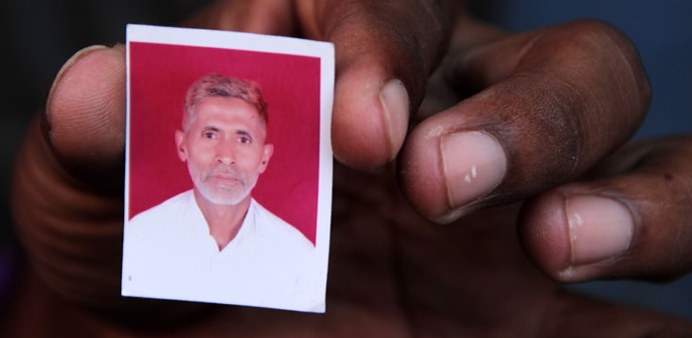AFP/ Lucknow
Indian police Wednesday formally charged 15 suspects over the mob murder of a Muslim man suspected of eating beef in late September, a case that sparked an outcry over communal intolerance.
Mohammad Akhlaq, 50, was dragged from his house in Bisada village in Uttar Pradesh state and beaten to death by around 100 people over rumours he had eaten beef -- a taboo in the Hindu-majority nation.
‘We have filed a charge sheet against 15 persons... it is a case of murder,’ additional director general of police in Uttar Pradesh, Daljeet Chaudhary, told AFP.
He added that police have charged a 17-year-old juvenile who was part of the group -- a day after Indian lawmakers passed a bill allowing tougher punishment for minors aged between 16-18 convicted of ‘heinous crimes’ including murder.
Akhlaq's murder fuelled concerns that religious intolerance may be growing under Prime Minister Narendra Modi's right-wing Bharatiya Janata Party government.
Critics accuse the Hindu nationalist government of having failed to protect minorities since it came to power at general elections in May last year.
While Modi did eventually describe the lynching as ‘unfortunate’, many commentators pointed out that it took the prime minister several weeks to respond.
Rumours that the family had eaten beef began when a calf was reported missing in Dadri village, 35 kilometres (22 miles) from New Delhi.
A nearby temple made an announcement via loudspeaker that the family had consumed beef and within minutes the mob kicked down Akhlaq's door and tore through his home before killing him.
Akhlaq's 22-year-old son was also seriously injured in the attack and was admitted into intensive care at a nearby hospital, where he has reportedly undergone several operations.
The victim's family has maintained they had mutton in the fridge and not beef.
Local media reports said the family now lives in the southern state of Tamil Nadu with Akhlaq's other son.
- Cow slaughter banned -
Cow slaughter and consumption of beef are banned in Rajasthan and many other states of officially secular India.
While the majority of India's 1.2 billion population is Hindu, the country is also home to sizeable Muslim, Christian and Buddhist minorities.
Several other incidents were reported in the following weeks, including the killing of a truck driver in northern Himachal Pradesh state for attempting to smuggle cattle to a slaughter house.
Critics say Hindu hardliners and their radical elements have become more emboldened since Modi's landslide victory.
Dozens of authors returned India's highest literary award in the aftermath of the killings, protesting against a rise in violence.
They criticised the government silence over the murder of a secular intellectual in August, while petitions demanding federal action have attracted signatures from scientists, actors and filmmakers.
Modi's BJP suffered a crushing blow in a key state election last month, which analysts partly blamed on its attempts to polarise voters along religious lines.

